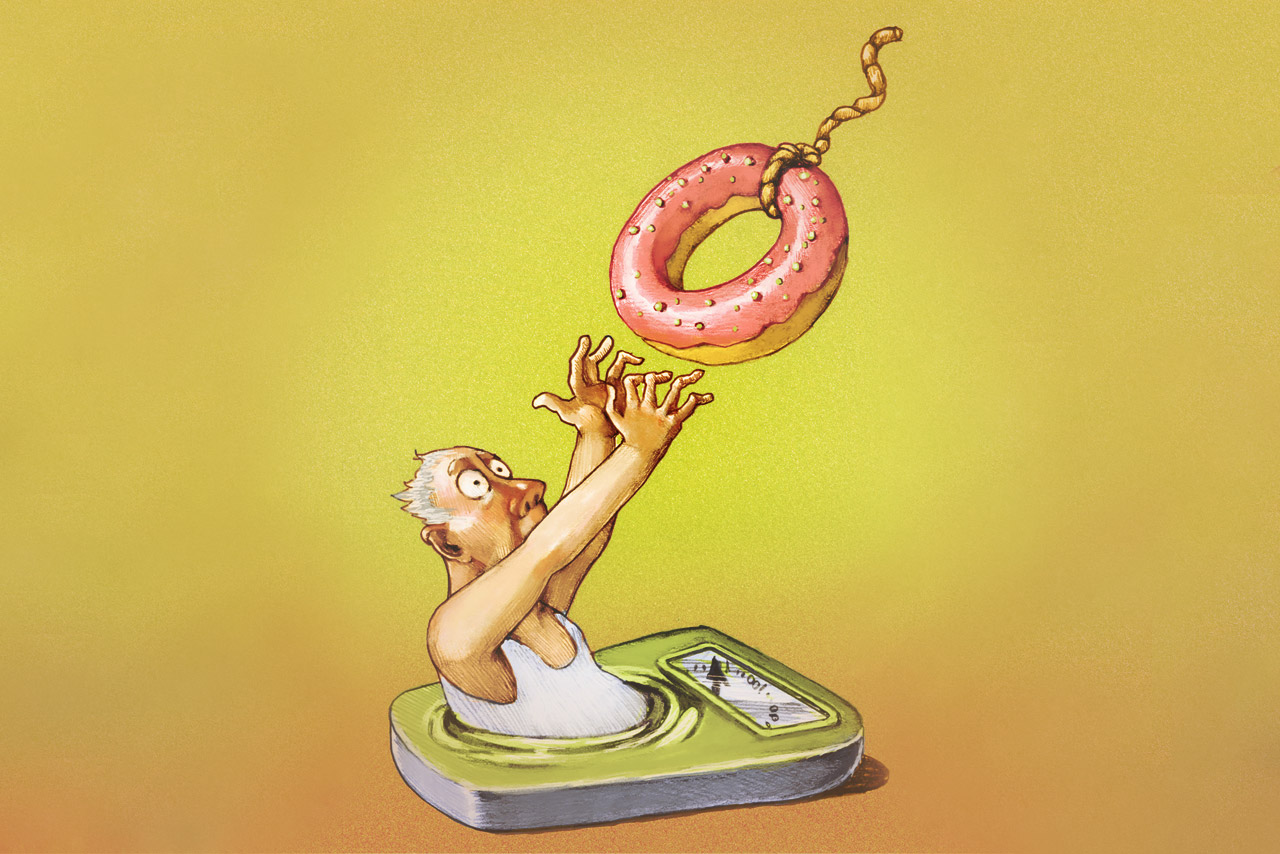
“Your body is precious. It is your vehicle for awakening. Treat it with care.” ~Buddha
When I went on my first diet in my teens (low-carb, it was back in the Atkins days), I wasn’t even overweight. I weighed less than 120 pounds, but my jeans had started to get a little tight, so I thought I needed to lose five pounds or so. At the time, I didn’t have a bad relationship with food; I just ate like a typical teenager—not the best choices.
About two hours in, I remember starting to obsess over the things I couldn’t eat and being desperate to be skinny ASAP so I could eat them again.
By mid day, I “failed.”
I caved and ate…. *gasp, shock, horror*… carbs.
And something weird happened. Instantly, I felt like I was bad.
It’s not just that I thought I had made a bad choice.
I thought, “You idiot, you can’t do anything right. Look at you, one meal in and you screwed up already. You may as well just eat whatever you want the rest of the day and start again tomorrow.”
I think I gained about five pounds from that attempt.
And I continued slowly gaining more and more weight every year after that—and feeling guiltier and guiltier every time I ate something “bad.”
Atkins low-carb miracle cure had failed me horribly and began a decades-long battle with food and my weight.
See, it wasn’t that I thought my choice was bad and then I just made a better choice next time; it was that I felt like I, as a person, was bad.
And what happens when we’re bad?
We get punished.
I didn’t realize until many years later, but those degrading thoughts and overeating the rest of the day were, in part, my way of punishing myself for being bad and eating the bad things.
The harder I tried to control what was going in, the worse it got and the more out of control I felt.
In my thirties I hit bottom, as they say, as a result of trying to follow a “clean eating meal plan.”
Four days into my first attempt to “eat clean” and strictly adhere to what someone else told me I should eat, I had my first-ever binge.
Prior to that, I had some minor food issues. I ate kind of crummy, had slowly been gaining weight, and felt guilty when I ate carbs (thanks, Atkins).
But a few days into “clean eating,” I was in the middle of a full-blown eating disorder.
The clean eating miracle craze may have made me look and feel amazing, but emotionally, it failed me horribly and began my years-long battle to recover from bulimia and binge eating.
But I thought it was just me. I was such a screw up, why couldn’t I just eat like a normal person?
I saw how much better I looked and felt when I was managing to “be good” and “eat clean,” but within a few days or weeks of “being good,” no matter how great I felt from eating that way, I always caved and ended up bingeing again.
And every time, I thought it was me. I told myself I was broken and weak and pathetic.
Even later, when I started training other people, my message was “If it’s not on your plan, it doesn’t go in your mouth” and “You can’t expect to get the body you want by eating the things that gave you the body you have.”
I wanted clients to feel amazing and get the best results possible, so I gave them what I knew would accomplish those two things.
But, at the time, I didn’t know that it was actually those messages and rules that had created all my own issues with food, and I most definitely didn’t know they would have that affect on anyone else.
I thought everyone else was “normal.” I was just broken and weak and stupid—that’s why I struggled so hard to just “be good” and “stop screwing up.” Normal people would see how much better they felt when they ate that way, and they’d automatically change and live happily ever after.
Ha. No.
The more people I trained, the more I became acutely aware that food is the thing most people struggle with the most, and I started recognizing the exact same thoughts and behaviors I’d experienced, in the majority of my clients.
And almost every single one of them also had a looong history of failed diets.
Hmmm. Maybe it wasn’t just me.
Not everyone goes to the extreme of bulimia, but the more I spoke with other people about their struggles with food and shared my own with them, the more I realized how shockingly pervasive disordered eating and eating disorders have become.
Binge eating is an eating disorder—one that more people struggle with than I ever imagined. Though, most people are horrified to admit it, and many may not even be willing to admit to themselves that they do.
I get that because it’s associated with lack of self-control and gluttony, and there’s a great deal of shame related to both of those things. But it actually has little to do with either, and you can’t change anything until you admit you’re struggling.
And disordered eating in general is even more pervasive.
Feeling guilt after eating is not normal. That’s disordered eating.
Restricting entire food groups is not normal. That’s disordered eating.
Severely restricting food in general in not normal. That’s disordered eating.
Beating yourself up for eating something “bad” is not normal. That’s disordered eating.
Starting and stopping a new diet every few weeks or months is not normal. That’s disordered eating.
Diet culture has us so screwed up that we spend most of our lives doing these things without ever realizing they’re not normal. And they’re negatively affecting our whole lives.
As I was working on my own recovery, I dove into hundreds of hours of research into dieting, habits, motivation, and disordered eating—anything I could get my hands on to help not only myself but my clients better stick to their plans.
It’s so easy, I used to think; there must be some trick to make us just eat what we’re supposed to eat!
But I learned the exact opposite.
I learned that trying to “stick to the plan” was actually the problem.
The solution wasn’t in finding some magic trick to help people follow their meal plans; the solution lay in not telling people what to eat in the first place.
There are many reasons behind why we eat what we eat, when we eat, and even the quantities we choose to eat; it just doesn’t work to tell someone to stop everything they know and just eat this much of this at this time of day, because at some later date it’ll make them skinny and happy.
Our brains don’t work that way.
Our brains actually work exactly the opposite.
As soon as we place restrictions on what we’re allowed or not allowed to eat, our brains start creating compulsions and obsessive thoughts that drive us to “cave.”
Have you ever noticed that as soon as you “can’t” have something, you automatically want it even more?
That’s a survival instinct that’s literally been hard-wired into our brains since the beginning of time.
In November 1944, post-WW II, physiologist Ancel Keys, PhD and psychologist Josef Brozek PhD began a nearly yearlong experiment on the psychological and physiological effects of starvation on thirty-six mentally and physically healthy young men.
The men were expected to lose one-quarter of their body weight. They spent the first three months eating a normal diet of 3,200 calories a day followed by six months of semi-starvation at approximately 1,600 calories a day (though 1,600 calories isn’t even all that low). The semi-starvation period was followed by three months of rehabilitation (2,000-3,200 calories a day) and finally an eight-week period of unrestricted rehabilitation, during which time there was no limitations on caloric intake.
Researchers closely monitored the physiological and psychological changes brought on by calorie restriction.
During the most restricted phase the changes were dramatic. Physically, the men became gaunt in appearance, and there were significant decreases in their strength, stamina, body temperature, heart rate, and even sex drive.
Psychologically, the effects were even more dramatic and mirror those almost anyone with any history of dieting can relate to.
They became obsessed with food. Any chance they had to get access to more food resulted in the men binge eating thousands of calories in a sitting.
Before the restriction period, the men were a lively bunch, discussing politics, current events, and more. During the restriction period, this quickly changed. They dreamt, read, fantasized, and talked about food all the time.
They became withdrawn, irritable, fatigued, and apathic. Depression, anxiety, and obsessive thinking (especially about food) were also observed.
For some men, the study proved too difficult—they were excluded as a result of breaking the diet or not meeting their weight loss goals.
We don’t struggle to follow diets and food rules because we lack willpower. It’s literally the way our brains are wired.
Why? Because from an evolutionary standpoint, we’re not designed to restrict food. Coded into our DNA is the overwhelming urge to survive, so when food (either over-all calories or food groups) is restricted, our brains begin to create urgency, compulsions, and strong desires that force us to fill its needs—and often, even more than its needs (binges).
We cave because our brains are hardwired to. Then the act of caving actually gets wired into our brains as a habit that we continue to repeat on autopilot every time we restrict food or food groups.
And it triggers the punish mode that I spoke of earlier, which only compounds the problem and slowly degrades our self-worth.
So every year millions of people are spending tens of billions of dollars on diets that are making the majority of us heavier, depressed, anxious, food-obsessed binge eaters, and destroying our self-worth.
Now I know all that sounds pretty bleak, but there is a way out. I know because I’ve found it.
It sounds like the opposite of what we should do, but it saved my life.
I gave myself permission to eat whatever I wanted, whenever I wanted, and stopped trying to restrict. The scarier that sounds, the more you need to do it.
As soon as nothing is off limits, we can begin to slowly move away from the scarcity mindset and break the habits and obsessions created by dieting.
When we give ourselves unconditional permission to eat whatever we want, without guilt or judgment, we give ourselves the space to get mindful about our choices.
We give ourselves the opportunity to explore why we’re making the choices we’re making and the power to freely make different ones because we begin to value ourselves again.
When we remove the guilt and judgment, start to value ourselves again, and work on being mindful, we can begin to notice how the foods we’re eating make us feel and make choices from a place of love and kindness rather than fear, guilt, and punishment.
It sounds too simple to work, but it saved my life.
Rather than telling people what they should and shouldn’t eat, or trying to listen to someone who’s telling us what we should or shouldn’t eat, we have to build a connection with our bodies.
We have to learn to listen to them, to learn to distinguish the difference between physical hunger and emotional hunger. To stop eating when we’re not physically hungry, and to start feeling emotions instead of feeding them.
We have to break the habits that drive autopilot eating. We have to be mindful, trust the wisdom of our own bodies, and make choices based on how they make our bodies feel rather than what some diet tells us is the answer to happiness and being skinny.
UPDATE: Making the choice to not eat meat for ethical reasons and avoiding certain foods for allergy/medical purposes are not the same as restricting food groups for a diet. If you’re happy and feel great with whatever you’re currently doing, carry on! This is meant for people who are struggling with repeated diet attempts and overeating/bingeing, who feel out of control because they can never seem to “stay on track.”
About Roni Davis
Drawing on her own healing process plus over a decade of professional knowledge, education, and experience, E-CET founder Roni Davis guides women through the process of uncovering and changing the thought and behavior patterns that cause weight and food struggles. Her clients break unhealthy eating habits and heal their relationships with food and their bodies while learning to approach their overall well-being from a place of connection, self-trust, compassion, and love. Learn more with her free Why We Eat video series.
- Web |
- More Posts













 Though I run this site, it is not mine. It's ours. It's not about me. It's about us. Your stories and your wisdom are just as meaningful as mine.
Though I run this site, it is not mine. It's ours. It's not about me. It's about us. Your stories and your wisdom are just as meaningful as mine.
Thank you for writing this article! I stumbled on this as the first article I have ever read on this site. I went on here to read about something completely different but this was the first option to come up, and immediately I was blown away because I have never seen binge eating described in this way, and how you laid it out is exactly the relationship I have with food. I’m sure that by being less hard on myself and condemning myself for eating a snack or two, it’ll help me make better eating choices for meals.
This is exactly my story and exactly the same way I found a way out as well. For those who need a great guide to extend off of this, Intuitive Eating is a great book!
I was very interested in reading this article because I struggle with disordered eating. However, I was quite disappointed to get to the end only to be told I needed to find a way out. Really? Like I haven’t been looking for a way out for 50 years. I still don’t know a way out.